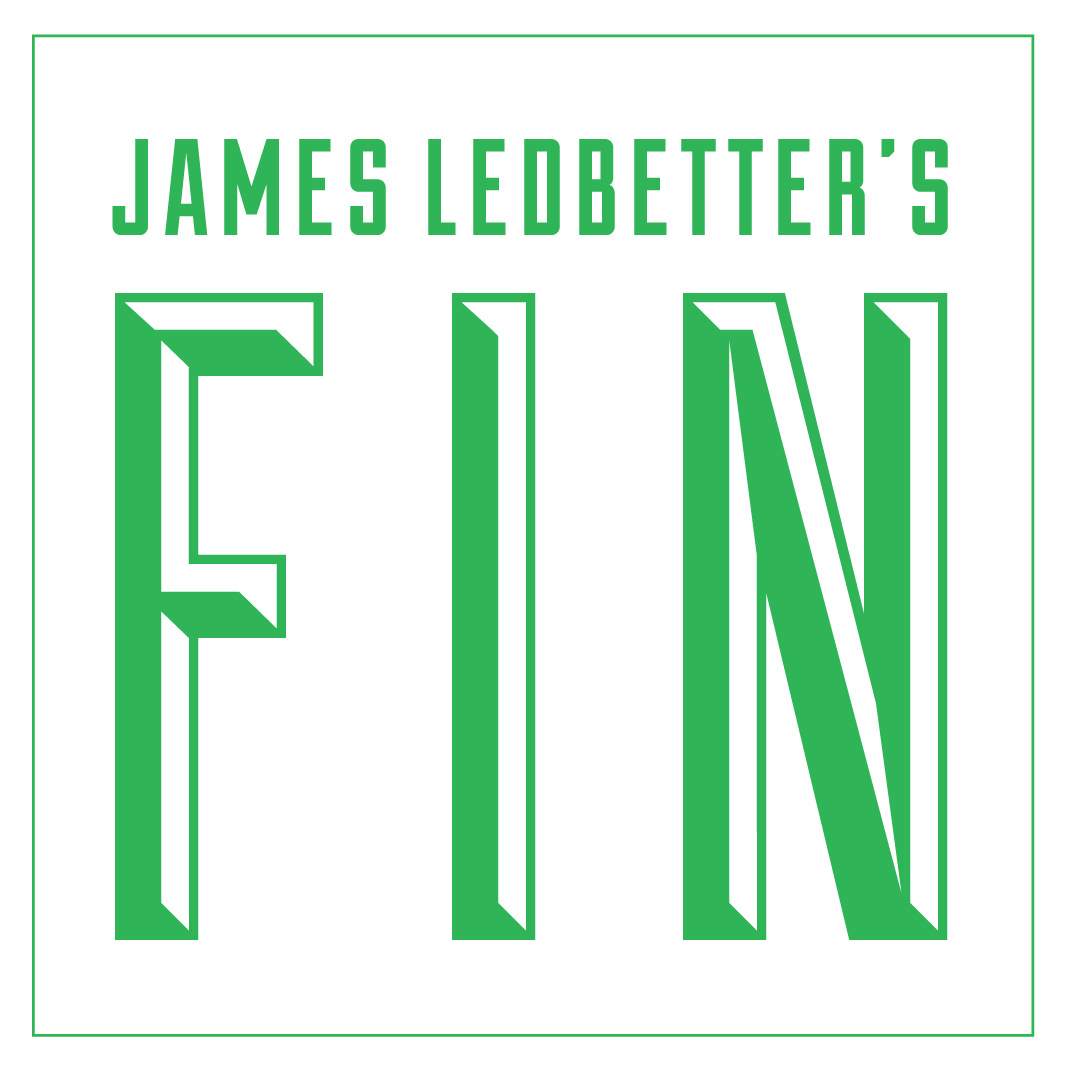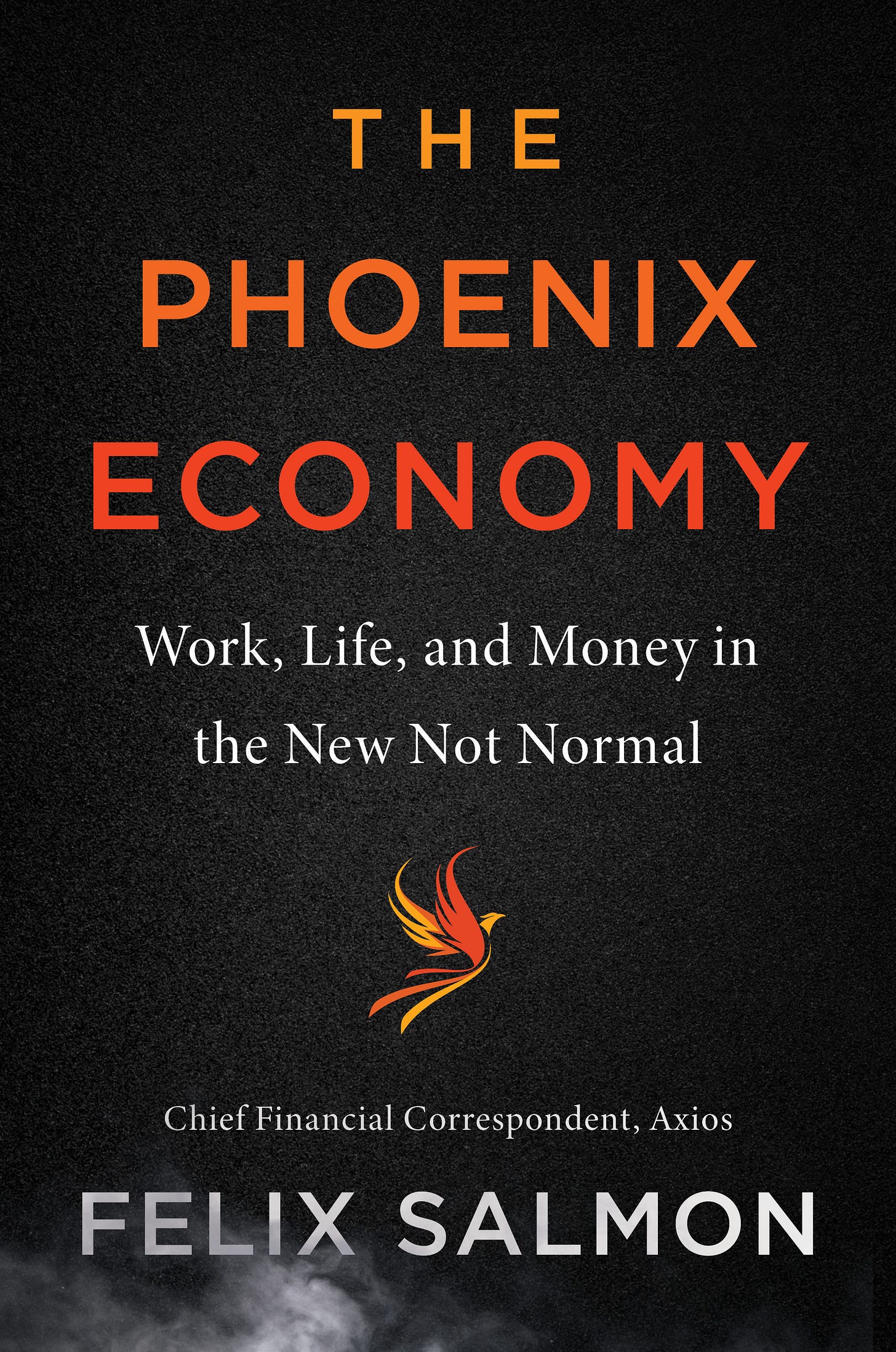"Income and Wealth Inequality Went Down During the Pandemic": A Q&A with Felix Salmon
Plus, the case for buying lottery tickets.
Number of the Week: $1.5 trillion (explanation below)
"Income and Wealth Inequality Went Down During the Pandemic": A Q&A with Felix Salmon
Felix Salmon is the chief financial correspondent for Axios. Next week his first book is published; The Phoenix Economy explores the economic impact of the COVID pandemic. FIN’s James Ledbetter recently interviewed Salmon about the book; this transcript has been edited for length and clarity.
FIN: Why don’t we start with: how did the COVID pandemic affect the world economy?
Salmon: Stopped it stone dead. That was really unprecedented, certainly in modern life or probably ever, for the entire global economy to just come to a screeching halt. No one knew what that would mean. Nouriel Roubini was saying that we were going to have a depression bigger than the Great Depression. The stock market went down like 30%. Even more important than that, there was this global economic flywheel spinning in what seemed like a very robust dynamic equilibrium. And when it stopped spinning, everything broke. A lot of people at the beginning were like, how are we going to get this flywheel spinning again? And the answer is, we never did. We probably never could, and it would’ve been super hard. Instead we built something new and a lot of the people who had this very reasonable desire to go back to normal, it was hard for them to understand how that was never possible. Even I massively underestimated the speed with which we could create a whole new different economy.
The Roubini prediction and others imply that the negative changes were nowhere near as bad as predicted. Why?
Put it this way. You can tell whether something is a surprise by whether it moves the market. Because if it isn’t a surprise, then it’s priced in. Obviously COVID was a surprise when market plunged, and then the strength and speed of the economic recovery from COVID was a surprise because the market soared—in fact, it soared much more than it had plunged. And it turns out that an occasional period of burning everything down and then just rebuilding it from scratch is not something you would ever deliberately choose to do, but can be incredibly salutary and interesting and innovative, and can reveal pockets of potential that you never really knew were there.
An example I give in the book is Microsoft Teams, which came out of absolutely nowhere. There was no one on the planet, not even within Microsoft, who would’ve imagined that Microsoft could have moved so fast, while working from home in this brand new remote work environment, to roll out a product that just decimated two seemingly incredibly strong companies—Slack and Zoom.
The other example, more germane to your newsletter: If you had asked any banker, “Would you be able to survive your workforce not being able to come into the office for weeks and months on end?” They would be like, “No way. We have a whole bunch of infosec protocols. We are in the middle of the incredibly secure payments and moving money industry. We have a bunch of confidential information that never leaves the office. We need people to come into the office.” This is why, for instance, the American stock market closed down after 9/11. Because you needed people to come into the office and if the office was closed because there was a terrorist attack, then you have to just close the entire market. So that would’ve been the expectation—that if we have to stay home for a couple of days, then we will stay home for a couple of days, but then we are going to need to go back because we need to go back. In fact, we did not go back, we were at home for months, and we made it work and all the banks were actually fine. And again, I don’t think anyone would've predicted that.
Some of the banks are saying that now people need to come back.
Right. But they’re not saying “need” or the entire global payment system will collapse. They’re saying need, as in we want to optimize our return on equity.
Microsoft Teams is an interesting example, but what really changed in a permanent way? What do you think will be the most lasting legacy, financially speaking, of the pandemic?
The way in which a huge amount of the economic value of commercial square footage has been moved into economic value of residential square footage. Even if you work from an office, if you are a middle-class person in America and you are buying a home or thinking of buying a home, even if you’re renting a home, you are always thinking much more about where are the places that are private, where are places that I can work, where are the rooms that I can have? Those are, in terms of real estate, bedrooms, people basically need an extra bedroom. An extra bedroom really increases the price. And that’s workspace, economic value that is being paid by employees rather than employers, that’s being bought in residential neighborhoods rather than commercial neighborhoods.
It is not just for white-collar, middle-class employees, it’s for kids doing their homework. People have massively reconfigured their idea of what it means to be at home. It’s not just a place where you eat as a family and go to sleep. It’s a place where you do more solitary stuff. If you remember back in the nineties, in the ‘00s, there was this boom in McMansions with cathedral ceilings and massive open spaces, three-car garages, and no one wants that anymore. What they want is something much more compartmentalized.
The book takes a very interesting, and to me unexpected, turn in chapter three, which is obviously a passion project of yours. Talk about the generational attitudes toward wealth and the way that they've changed with Gen X.
In terms of stock market investing, Boomers mostly had some kind of pension plan. Someone else was in charge of that. So the minority of them who had stockbrokers and bought and sold stocks, this was like an upper-middle-class hobby. Most of them made money because there was a bull market, and so they all felt very clever. Index funds were very new, people sort of wrinkled their noses up and didn’t understand. And they were actually really expensive. This current world that we live in where you can buy an S&P 500 index fund for four basis points…they were 150, 200, 300 basis points. The technology of running one of these things is actually quite sophisticated and they barely had computers back then. So then you get Gen X, we’re the slackers. We got burned in the first dot-com crash, and we’re like “Fuck this stock buying malarkey.” Index funds seemed to make a whole bunch of sense. We were absolutely right, young enough to be able to learn new things in a way that Boomers often didn’t.
They were still living in that world of stockbrokers. And then the millennials never had any money at all. So it was all a completely moot point for them. They were just sitting there with massive student loan debt and going, “Haha, isn’t that a funny joke? You’re talking about the stock market, right now I have negative net worth and wake me up when I’m done.” That’s where the pandemic comes in, because suddenly they have time, they have liquidity from the stimulus checks and all of the other fiscal stimulus, and they have Robinhood on their phones and it’s fun and the stock market is going up and to the right at an amazing pace. And they learn the exact opposite lesson to what Gen X did in the stock market crash in 2000. We learned that stocks go down, they learned that stocks go up. And so they became this whole new generation of stock traders, which came out of nowhere.
You also make the point that what people spend their money on has changed. Housing, for example, as a percentage of household expenditure.
It’s up, not up as much as you might imagine. People always have this idea that when the Boomers bought their houses for $30,000, they were getting this incredibly cheap bargain and they don’t understand how hard it is to buy a house. That’s true, but it’s not entirely true, especially outside the big cities, and when the Boomers bought their houses for $30,000 the interest rate was 16%. As a percentage of their take home income, those mortgages were not easy to pay. We did have two big short-term shifts around the pandemic and we were all stuck at home. We had a massive spike in goods and the services basically going to zero.
When the reopening hit, we had a massive falling off a cliff of goods and services going through the roof and travel in particular, there’s this vague, vibey smell of YOLO in the air. And it’s been there for a couple of years now, and it provides an incredible tailwind for anyone opening restaurants, anyone in the travel industry, anyone selling experiences.
Getting back to stock trading for a minute. Once the stimulus disappears, once people have to go back to jobs in some way, does it imply that that trading boom goes away? Or is it more permanent?
That’s exactly what happened. When the stimulus disappeared, that trading boom went away for sure. But what we didn’t have was a crash. What we didn't have was substantial losses among people who couldn’t afford them. Everyone looking at the meme stocks and shaking their head and saying, this is all going to end in tears, was wrong. The people who were playing it, and even the people who lost all their money in it, they had fun. There’s something ironic and social about the meme stock phenomenon, which is super important.
And YOLO means two things, right? YOLO means I need to spend my money right now because I could get hit by a bug tomorrow and die. But it also means I don’t believe in this concept of getting rich slowly; I still have my student loans and everything. If I’m ever going to really make it, I’m going to need to just strike it lucky on Dogecoin.
This is related to your advice that people should buy lottery tickets, right?
I’m a fully bought-in Gen X passive investor. For me, especially now that interest rates are back to 5%, I believe in the whole get rich slowly thing. The literal lottery ticket is a way of blowing off steam. If what you want to do is purchase the dream of getting rich quick, then buying a lottery ticket is a fantastic way of doing that. Buying a bunch of Rivian stock is a terrible way of doing that.
It's debatable whether we’re in a banking crisis…
Mini-crisis.
Do you associate the current banking mini-crisis with the pandemic?
Oh, absolutely. The insane flood of liquidity that came into the economy from both the Fed and Treasury during the pandemic found its way largely to Silicon Valley and California. And wound up sitting in bank accounts at Silicon Valley Bank and First Republic Bank. And then when that tide started going out, the banks died. If the money had never come in, they would’ve been fine. It was that in and out action that really killed them.
That seems related to your broader point about inequality, right? The fact that so much money flowed to Silicon Valley during the pandemic.
So the inequality bit is complex. One of the things that I tried to celebrate is that both income and wealth inequality went down during the pandemic. It’s mostly because poor people got a lot richer, they got stimulus and also, you had this almost overnight change from minimum wage being $7 to minimum wage being $15. People literally saw their salaries double at the lower end of the income spectrum. And that’s huge.
Why did that happen?
Because you suddenly had this massive increase in demand to services when you had the reopening, combined with YOLO feeling among hospitality workers, and people working in meat packing plants “I do not need to spend the best years of my life having this miserable job getting shouted at?” There was a Great Resignation at exactly the same time as demand for those services went through the roof. So that supply and demand imbalance caused salaries to soar. What worries me about the inequality thing is it’s not really an American story, it’s really a global story, right? The United States has done surprisingly well. Sub-Saharan Africa has not, and if you look at the amount of poverty in the world, it is much, much higher than it would and should have been. COVAX was a complete disaster. And now we are seeing that increase in global inequality at exactly the worst time, as we are heading into the teeth of global climate change. That’s just going to make things even worse.
What would you say are the most enduring technological changes brought on by the pandemic?
The speed with which we developed those mRNA vaccines was absolutely amazing. And that is replicable to a bunch of different diseases and problems. Right now, the same team at University of Oxford that developed the AstraZeneca vaccine has put out this new vaccine, called R 21, against malaria. Which is incredibly effective, it’s been already been approved by both Ghana and Nigeria. We’ve been looking for a malaria vaccine for decades. And then now boom, we have one.
What about digital payments, digital currency?
The big thesis of the book is we should expect the unexpected; I’m not in the business of making predictions. One of the unexpected things that happened in the world of payments was that when Russia invaded Ukraine, people started talking about the nuclear option, which was cutting Russia off from SWIFT and from the global payment system. And then within a couple of weeks we actually did that. Which they didn’t do in 2014, because they thought it was so nuclear and then they did it, and then it basically didn’t have any effect.
Dan Davis has a newsletter out saying plumbing isn’t architecture. By cutting Russia off from SWIFT, you’re not actually changing the architecture, you’re just changing the plumbing. I think that ultimately digital payments are plumbing; digital payments are boring and people will pay somehow. The long arc of history moves towards easier and cheaper and faster payments. And payments is a publicly-owned utility rather than a privately-owned profit center. So Venmo is not a long-term amazing company as far as I’m concerned, because this whole idea of having to set up a whole new account at some dumb fintech in order to be able to pay people makes no sense. Ultimately we won’t need that. Does that mean that the US government is going to put the dollar on the blockchain? It doesn’t really matter. That’s plumbing, you know?
FINvestments
🦈Number of the Week: A report this week from Boston Consulting Group predicts that the global fintech industry will grow to $1.5 trillion in revenues by 2030. “The fintech sector, which currently holds a 2% share of the $12.5 trillion in global financial services revenue, is estimated to grow up to 7%, of which banking fintechs are expected to constitute almost 25% of all banking valuations worldwide by 2030,” BCG said.
🦈While many fintech companies have been struggling over the last year or so, Mercado Libre, the Argentina-based shopping and payments firm, is flourishing in Latin America. The Economist attributes its success to “a mix of good management and good fortune” and “a deep understanding of local shopping habits.”
🦈There is a fortune to be made in the back catalog of musical recording. This week, the New York-based startup Duetti announced a $32 million fundraising round for a music catalog sales platform.






